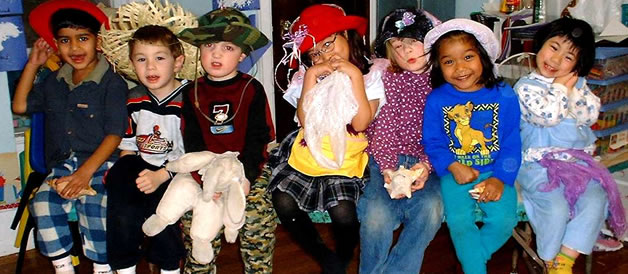Our philosophy is that children are like “sponges” when it come to absorbing information! Children can learn anything, as long as the information is brought down to their level, using basic language, incorporating fun and games as well as a hefty sense of humor, and by providing hands-on activities that enable children to use their senses in order to process the information, or rather, to learn the concepts. Children who are three, four, and five years of age learn best by seeing, touching, hearing, tasting, and smelling. In other words, they learn best by doing!
Also, children at this age are constantly learning from the time they awake until the time they go to sleep at night! They learn by observing adults and other children and by imitating behavior. It is most important therefore for children at this stage to be in a positive environment supported with kindness and nurturing.
The world will be forever changed by the life of each child and their individual abilities, talents, personalities, intellects, and special gifts they have to contribute to society! Our responsibility as parents and teachers together is to acknowledge the individuality of each child, to search out and identify those unique and wonderful gifts each child possesses, and to gently guide them through these early formative years to explore, to experience, and to learn to their full potential.
Lastly, our philosophy of learning centers around the THD model, that is THE TOTAL HUMAN DEVELOPMENT MODEL. This model provides the foundation of learning through what research indicates that developing the whole person includes,the physical, emotional, intellectual, and spiritual aspects of an individual’s makeup.
Learning occurs within the context of relationships. Relationships, whether teacher to student, student to student, teacher to teacher provide the essential foundation of all learning. Relationships that children develop with their parents, their extended families, their siblings, their neighbors, their coaches, their friends and their teachers will dramatically impact their growth and development. Within the web of relationships lies two underlying cores, universal values – Respect, and Responsibility. Our program fosters respect for oneself, respect for other people, and respect for all forms of life and the environment that sustains them. Responsibility is the action-side of respect. If you respect other people, you value them. If you value them, you feel a measure of responsibility for their welfare. It takes an entire village to raise a child! The THD model develops the whole child within the whole community of parents, teachers, friends.
Educational psychology suggests that people learn in three distinct ways: through modeling and imitation (Social Learning Theory) , by reinforcing rules through rewards and consequences (Behavioral Learning Theory), and through active dialogue and thinking (Cognitive-Developmental Learning Theory).The THD model bases itself upon these three models. Rockland Montessori School provides a positive and nurturing environment for children to model and imitate, our program uses a total “positive reinforcement” approach with.children to encourage and reward all the positive behaviors and learning that they exhibit, and our curriculum fosters their cognitive-developmental teaming by providing them with learning situations that spark their curiosity, challenge their intellect, develop their critical thinking skills, and expand their horizons!
Educators and parents are just beginning to appreciate how important education is to a child in the early, formative years. We, at the Rockland, have known this for the 64 years we have been teaching young children thus far! A mind is a terrible thing to waste!
A hundred years from now it will not matter what my bank account was, the sort of house I lived in or the kind of car I drove . . . but the world may be different because I was important in the life of a child.


